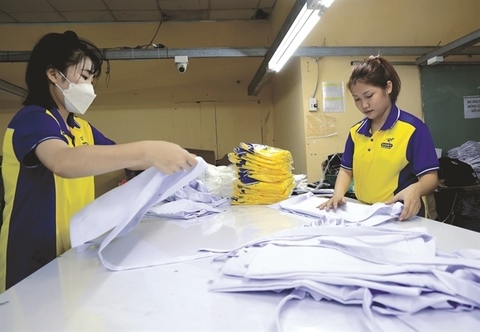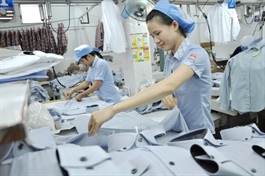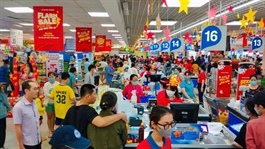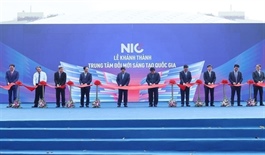Textile, garment sector expects better performance in Q4
Textile, garment sector expects better performance in Q4
Việt Nam's textile and garment industry expects to have a better performance in production and business in the fourth quarter of this year, creating momentum for recovery in 2024.

In the first nine months, the textile and garment export turnover reached $25.5 billion, down 12.1 per cent over the same period last year. VNA/VNS —Photo Hồng Điệp |
In the fourth quarter of 2023, almost all of the Vietnam National Textile and Garment Group (Vinatex)'s businesses have fewer orders than every year, but there are signs of customers increasing orders.
For the fiber industry, the price of cotton put into production in the third and fourth quarters of 2023 is currently approaching the market price and is lower than the first six months of the year, helping the fiber industry be more effective in production and business.
Trần Hữu Phong, chairman of Vinatex Phú Hưng JSC, said in the last months of 2023, the fiber industry still does not have many signs of improvement, while businesses face multiple challenges, including a high level in fiber production costs, electricity prices, high-interest rates, and raw material prices.
Besides that, other problems of the textile and garment enterprises are market work and labour productivity, meanwhile, they are facing heavy competition from rivals.
Phong believes that they need to restructure the markets and be determined with their goals. For the businesses that have already had markets, it is necessary to improve the quality of products to strengthen their position. In addition, quality is also an important factor as they cannot develop a market with poor-quality products.
Meanwhile, Trần Thị Kim Chi, general director of Phú Bài Fiber JSC, said that fiber production in the coming time must be calculated carefully. Excessive raw material inventory and a high price of input material put a lot of pressure on the yarn production businesses.
Phú Bài is also greatly affected by exchange rates and reduced profits, but it realises the need to continue to produce high-quality yarn, reduce costs, and choose customers. Especially, Phú Bài follows closely the market to increase production of products that the market needs.
According to businesses, 2024 will be a year of great competition in price. Furthermore, customers will have few orders, but require fast delivery, high product complexity, diversification of designs, and strict quality.
Along with that, customers are very interested in product quality and choose businesses to sign long-term cooperation agreements.
Nguyễn Xuân Dương, chairman of Hưng Yên Garment Corporation, said the world market now faces many difficulties because the increase in the prices of oil, fuel, and food makes the consumers' demand go down, including for textiles.
Therefore, the businesses need to invest in high automation, improve the capacity of workers, and reduce costs of capital management, Dương said.
The first nine months of 2023 passed with many difficulties affecting the economy in general as well as the textile industry.
The Ministry of Industry and Trade reported that in the first nine months, the textile and garment export turnover reached $25.5 billion, down 12.1 per cent over the same period last year.
According to Vinatex, the enterprises will face prolonged difficulties in production and business activities due to the decline in the growth of the main textile import markets.
Along with that, they also have to suffer an increase in input costs, including an increase of 3 per cent in energy and electricity prices from May, and a 3 per cent increase in exchange rates since the end of the second quarter. At the same time, they also face fierce competition in terms of price from rival countries.
This situation puts businesses in facing many challenges in terms of market, finance, production and business methods, while the export orders have decreased in quantity, are highly demanding, have short-term order plans, and an extension of delivery time, affecting production and business results in 2023.
Lê Mạc Thuận, deputy general director of Vinatex, said that all enterprises in the domestic garment industry in 2023 cannot avoid impacts from the decline in global demand.
However, the businesses having customers in the US market will recover better and faster, while the European market still has difficulty, Thuận said.
Thân Đức Việt, general director of Garment 10 Corporation, said his enterprise's advantage is shirts, but in 2023, this goods item suffers the most damage.
Accordingly, shirts accounted for 60 per cent of Garment 10's export volume in previous years, but now it only accounts for 39 per cent. The business has to make orders of pants, polo shirts, and T-shirts.
So, to achieve the targets, the businesses in the textile and garment industry are required to seize opportunities to enhance production and business in the last quarter. That would also create momentum for production and business plans in 2024.


























